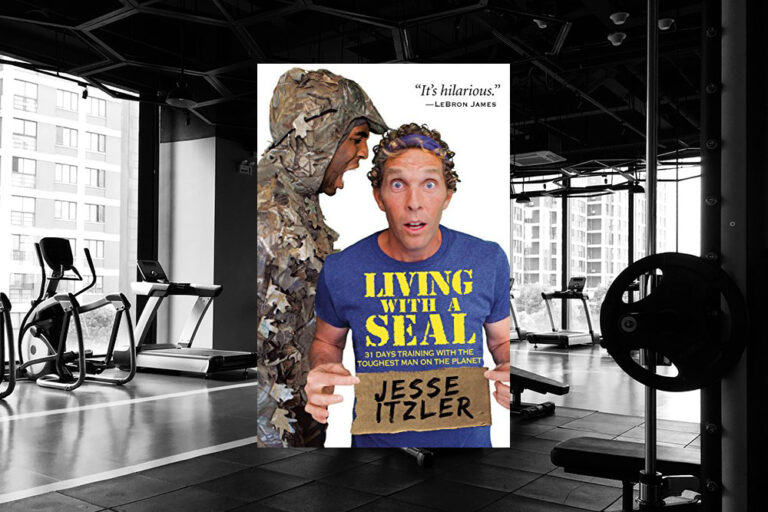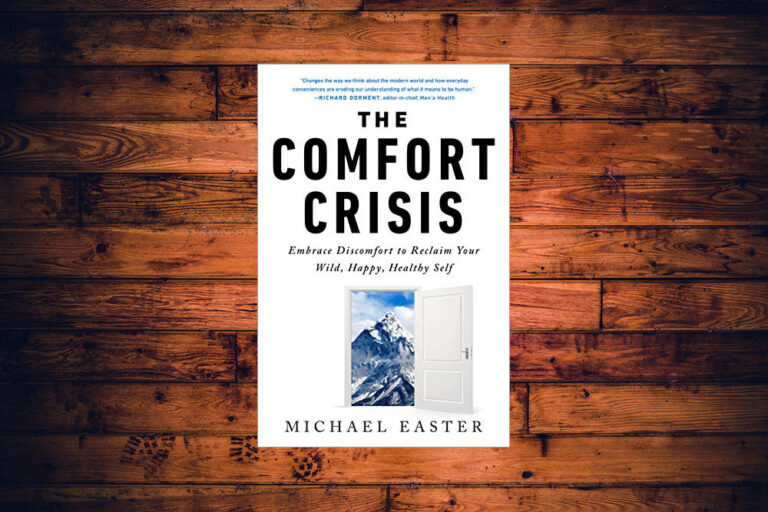#25: Mental Shifts to Master Your Mind. Lessons From “Can’t Hurt Me” by David Goggins (Part 1)

If you’re reading this, David Goggins probably needs no introduction. But in case he does, David is the most renowned icon of mental toughness. He’s an ex-Navy SEAL and an ultramarathon runner known for competing in and winning some of the hardest races in the world.
His story of transformation from an obese pest exterminator to a tough Navy SEAL was published in his bestselling autobiography Can’t Hurt Me: Master Your Mind and Defy the Odds. He was also covered in Jesse Itzler’s book Living With a SEAL.
Some of the feats he accomplished include losing over 100 pounds (45 kg) in three months, going through grueling Navy SEAL training three times, and breaking the world record in pull-ups.
I read David’s book when it came out in 2018. Because it’s been several years since then, I recently re-read it. As is often the case with great books, the second time I read it I found it much more powerful than the first time.
Consequently, I decided to publish a series of articles covering David’s book. As always, each article follows a certain theme. Today we’re going to cover mental shifts to master your mind: the necessary inner changes that will help you explore your true capabilities.
(Side note: if you want even more lessons from David, I created a list of the best podcast interviews with David Goggins.)
The First Step to Master Your Mind
Odds are you have had a much better childhood than I did, and even now might have a damn decent life, but no matter who you are, who your parents are or were, where you live, what you do for a living, or how much money you have, you’re probably living at about 40 percent of your true capability.
The entire premise of David’s book is that we’re all selling ourselves short. He was selling himself short as an obese pest exterminator, following the path of least resistance. When he decided to become a Navy SEAL, he unlocked hidden potential that has changed the trajectory of his life.
The first step to master your mind is to acknowledge and internalize this important mental shift: you CAN be in a completely different place than you are today. All that stands in the way is YOU.
If you’re obese, you CAN become one of the fittest people you know.
If you don’t consider yourself smart, you CAN become one of the smartest people you know.
If you lack self-discipline, you CAN become one of the most self-disciplined people you know.
David says that most people live at best at 40% of their true capability. And my guess is that many men are living at much less, maybe 5-10%.
Imagine what would happen if you were to increase your potential to 60%. What would happen if you reached 80%? And what would happen if you went all out and reached 100%?
This ambitious mentality is described later in the book when David writes:
Heraclitus, a philosopher born in the Persian Empire back in the fifth century BC, had it right when he wrote about men on the battlefield. “Out of every one hundred men,” he wrote, “ten shouldn’t even be there, eighty are just targets, nine are the real fighters, and we are lucky to have them, for they make the battle. Ah, but the one, one is a warrior…”
From the time you take your first breath, you become eligible to die. You also become eligible to find your greatness and become the One Warrior. But it is up to you to equip yourself for the battle ahead. Only you can master your mind, which is what it takes to live a bold life filled with accomplishments most people consider beyond their capability.
(Fun side fact: the quote is misattributed. Heraclitus never said it.)
Throughout this article series we’ll cover various techniques that will help you master your mind. For now, the first step is to acknowledge that there IS greatness inside you but it stays hidden because you sell yourself short.
One exercise that may help understand your potential is writing down a list of impossible—for your current self— goals and mapping out a path that would help you accomplish them. Having a plan often turns impossible into doable.
When David decided to become a Navy SEAL, he was nowhere close to resembling an elite special operator. Yet, once he set his mission and equipped himself with the right tools and habits for the battle ahead, he took his life from maybe 5% of his potential to well above 40%.
What changed? He believed he could be so much more than he was—and then followed the path he laid for himself.
This mental shift is not just a cheap motivational platitude: it’s a key tool to begin your personal transformation.
Move the Needle Bit by Bit
(…) there is no need for you to find your own impossible task and achieve it on the fast track. This is not about changing your life instantly, it’s about moving the needle bit by bit and making those changes sustainable. That means digging down to the micro level and doing something that sucks every day. Even if it’s as simple as making your bed, doing the dishes, ironing your clothes, or getting up before dawn and running two miles each day. Once that becomes comfortable, take it to five, then ten miles. If you already do all those things, find something you aren’t doing. We all have areas in our lives we either ignore or can improve upon. Find yours. We often choose to focus on our strengths rather than our weaknesses. Use this time to make your weaknesses your strengths.
Doing things—even small things—that make you uncomfortable will help make you strong. The more often you get uncomfortable the stronger you’ll become, and soon you’ll develop a more productive, can-do dialogue with yourself in stressful situations.
Mastering your mind is as much about pursuing big goals as it is about doing things on the small scale to build self-confidence and self-respect.
In the military, little things like a perfectly made bed, polished boots, or neatly folded clothes are a non-negotiable everyday task to learn how to follow the rules and pay attention to details.
These little, seemingly insignificant things can have a huge impact on your performance.
Positive psychologists often talk about keystone habits: small changes that carry over into other aspects of your life. They can have a positive or a negative impact on your life, thus creating either a virtuous or a vicious cycle.
Tidiness is one such habit. A tidy person is more likely to be responsible and disciplined, while a person who doesn’t keep their environment clean may have a mess in their mind as well.
A pile of unwashed dishes in your sink isn’t a big deal—after all, who does the dishes right away?
But later you also neglect throwing away the trash, cleaning after yourself in the bathroom, and keeping your work desk tidy. All these behaviors add up into making you a disorderly person. Now you struggle to have self-discipline to go on a morning run, study for an important exam, or complete a work project on time.
Another example of a negative keystone habit is something as innocent as having one beer after work. It seems like something normal that everyone does. Yet, for many men, that one beer often turns into two or three, especially after a hard day.
Soon, they’re too lazy to get anything done after work to get ahead in life. In no time, their entire weekends revolve around drinking beer.
In the end, such a simple little habit can wreck your life. Is it really that insignificant?
As an empowering keystone habit, David suggests doing something that sucks every day.
Imagine what would happen if each day you pursued uncomfortable but valuable tasks. Each day, you’d be improving your ability to overcome laziness and choose instant gratification. Soon, you’d learn to push through any resistance and always opt for delayed, more significant rewards later on.
Reach Into Your Cookie Jar
The feeling of being that kid, locked in a moment of gratitude for a simple gift like a cookie, came back to me. I felt it viscerally, and I used that concept to stuff a new kind of Cookie Jar. Inside it were all my past victories.
Like the time when I had to study three times as hard as anybody else during my senior year in high school just to graduate. That was a cookie. Or when I passed the ASVAB test as a senior and then again to get into BUD/S. Two more cookies. I remembered dropping over a hundred pounds in under three months, conquering my fear of water, graduating BUD/S at the top of my class, and being named Enlisted Honor Man in Army Ranger School (more on that soon). All those were cookies loaded with chocolate chunks.
These weren’t mere flashbacks. I wasn’t just floating through my memory files, I actually tapped into the emotional state I felt during those victories, and in so doing accessed my sympathetic nervous system once again. My adrenaline took over, the pain started to fade just enough, and my pace picked up. I began swinging my arms and lengthening my stride. My fractured feet were still a bloody mess, full of blisters, the toenails peeling off almost every toe, but I kept pounding, and soon it was me who was slaloming runners with pained expressions as I raced the clock.
We all have a cookie jar inside us, because life, being what it is, has always tested us. Even if you’re feeling low and beat down by life right now, I guarantee you can think of a time or two when you overcame odds and tasted success. It doesn’t have to be a big victory either. It can be something small.
One of the reasons why even the little things matter is because in moments of doubt we can draw strength from our good behaviors. Every single time you win against yourself can become a cookie that will reinforce your resolve in hard moments. If you rarely engage in such positive behaviors, you may be lacking cookies to get fuel from when the going gets tough.
David used his cookies to complete his first 100-mile run on broken feet. We don’t need to (and probably shouldn’t) follow his tracks that far but it doesn’t mean that we can neglect our own cookie jars. Quite the contrary: just as you can use this concept to finish an ultra-marathon you can also use it to finish an important task today or turn around a lazy day.
How? Remind yourself of your past little victories (such as that time you overcame procrastination and got to work) and tap into the same emotional state to snap yourself out of your current lazy mood.
Whether you’re doing something extremely hard or something less spectacular, having a cookie jar full of cookies is an important mental tool to master your mind. When your willpower is running low, a reminder or two of past triumphs can bring it back high enough to let you survive the ordeal you’re going through.
Push Past Your Normal Stopping Point
The main objective here is to slowly start to remove the governor from your brain.
First, a quick reminder of how this process works. In 1999, when I weighed 297 pounds, my first run was a quarter mile. Fast forward to 2007, I ran 205 miles in thirty-nine hours, nonstop. I didn’t get there overnight, and I don’t expect you to either. Your job is to push past your normal stopping point.
Whether you are running on a treadmill or doing a set of push-ups, get to the point where you are so tired and in pain that your mind is begging you to stop. Then push just 5 to 10 percent further. If the most push-ups you have ever done is one hundred in a workout, do 105 or 110. If you normally run thirty miles each week, run 10 percent more next week.
This gradual ramp-up will help prevent injury and allow your body and mind to slowly adapt to your new workload. It also resets your baseline, which is important because you’re about to increase your workload another 5 to 10 percent the following week, and the week after that.
One of the common misunderstandings I encounter when I hear people talking about David Goggins is that the only “right” way to follow his advice is to do something extreme (and usually stupid).
Pumped up after completing the book, people sign up for a marathon next month with no training or they aim to do 1,000 push-ups in a single day. As incredible as these pursuits can be, they almost always end badly for the pumped up, unprepared individual who misunderstood David’s message.
David’s first run was a quarter mile (400 meters). It took him EIGHT years to go from a quarter mile to running 205 miles (330 km) non-stop.
Where’s that marathon next month? It didn’t happen for David.
Even that infamous 100-mile run in San Diego that David did on a three days’ notice wasn’t as reckless as a person trying to run a marathon with zero experience would be. David had a jar full of cookies to draw strength from for this race.
He already had several years of experience with running. He had also survived Hell Week (an incredibly hard endurance event to weed out recruits who aren’t strong enough to join the Navy SEALs) three times. All his training before, even if not specific to ultra-running, provided a foundation for his 100-mile run.
In other words, David’s baseline for what was hard was much higher than for a regular person. Your stereotypical coach-dweller would stand no chance to run even 20 miles of that race, let alone 100.
The human body can take a lot of beating and with a strong mind we can accomplish a lot. But there are some hard limits we can’t cross without destructive consequences.
For example, if you’ve never run a day in your life, even if you somehow manage to complete a marathon (extremely unlikely), your body will be utterly destroyed. It will take you months to recover from it—months that you could have used to train sustainably and run your first marathon without wrecking yourself.
Ultimately, the foundation of personal transformation is a sustainable, consistent change. The goal is to push 5-10% extra past your normal stopping point and be able to repeat it over days, weeks, months, and years. That’s the true challenge—not just doing it once but for the rest of your life.
Going from zero to a hundred may look glamorous but it’s stupid, irresponsible, and will result in terrible short-term injuries in the best case and a permanent disability in the worst case.
Schedule Rest, Too
But remember that you also need rest, so schedule that in. Listen to your body, sneak in those ten- to twenty-minute power naps when necessary, and take one full rest day per week. If it’s a rest day, truly allow your mind and body to relax. Turn your phone off. Keep the computer shut down. A rest day means you should be relaxed, hanging with friends or family, and eating and drinking well, so you can recharge and get back at it. It’s not a day to lose yourself in technology or stay hunched at your desk in the form of a damn question mark.
The whole point of the twenty-four-hour mission is to keep up a championship pace, not for a season or a year, but for your entire life! That requires quality rest and recovery time. Because there is no finish line. There is always more to learn, and you will always have weaknesses to strengthen if you want to become as hard as woodpecker lips.
Another misconception people have about David Goggins is that he never rests and works out all the time. Inspired by the book, many people start a new “Goggins style” hardcore workout plan that ignores the fact that the body needs sufficient rest to adapt.
When you’re pumped up, it’s tempting to go all out right away and keep going for as long as you can. But the most likely outcome is that you’ll get injured. Going super hard with no recovery strategy will set you back instead of helping you go forward.
If you want to become as tough as David, this isn’t about pushing as hard as you can for a few weeks or a few months. It’s about keeping up what David calls a championship pace for your entire life. Without rest and recovery, regardless of how strong your mind is, it’s impossible to continue improving at such a pace.
The mental shift in regards to this is that you don’t look for quick fixes that provide fast results but eventually burn you out. Instead, you seek sustainable results with ever-increasing difficulty, respecting that it takes time to transform yourself into a beast.
For high achievers, the notion of spending one day a week doing nothing is more uncomfortable than another hard workout. But having a rest day doesn’t mean you do absolutely nothing. Casual walks, an easy bike ride, a relaxed swimming session, yoga or stretching can all promote recovery.
And if you need a break from physical activities, you can still work on other aspects of your life: read books, meditate, listen to a podcast, or simply spend time with family and friends.
Your off days are as important part of your routine as your on days are. Putting the body and mind through stress damages them, while rest helps recover and get stronger.
Questions to Ponder
1. How could you go beyond your current capabilities and see what lies beyond the 40% of the potential you’re (at best) using now?
2. Are your keystone habits creating a positive or a negative loop in your life?
3. How big is your cookie jar? Are you adding new cookies to it regularly?
4. When your mind is begging you to stop, do you add that 5-10% extra before you give up? Are you capable of doing it consistently for weeks, months, and years?
5. Do you treat your rest days seriously and recover as hard as you train?
If you want more advice on how to master your mind, sign up for a free weekly Discomfort Club newsletter. Enter your email address below:






